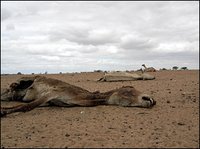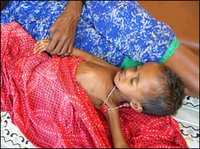Thirst and Hunger


There's a famine in the Horn of Africa. Children are dying from malnutrition. The animals whose milk fed them have died from dehydration. Cattle and camels collapse of thirst midway between watering holes that are further and further apart. Mothers have to carry their children to hospitals, and relief stations set up by international philanthropic organizations, to be fed. Too often the mothers are too late and the children, although they have eaten, die the next day.
I'm deeply troubled to hear about people dying of hunger. It breaks me; it makes me want to pack up cans and dry goods from my pantry and fly halfway across the world. But I'm troubled too by this impulsiveness, by the lack of thought that it involves. If I force myself to think rationally, I begin to understand that providing relief to regions affected by famine reinforces a system that cannot support itself. It seems wrong to put so much energy into short-term solutions rather than long-term ones. How can these people who are suffering so much be helped in a way that will make them self-sufficient in the long run?
Some time ago I worked at a food bank, here in California. On Friday afternoons, an affable, talkative volunteer who wore a silvery blonde wig gave me a ride to the food bank (I didn't have a car then). I spent a few hours in the back room packing canned meat and fruit and vegetables, and stale baked goods donated by grocery stores, into large paper bags. I heard stories about the people for whom I was doing all this: the homeless; the single mothers with minimum-wage jobs and too many children; elderly people with insufficient pensions and families too busy or too far away to take care of them; and once a father with seven children, whose wife had left him just the night before. I didn't question that my work at the food bank was good, part of the solution to a social problem.
I'm not so sure now. Sometimes the best thing to do when people are hungry is to feed them and not think too much about the consequences. Small acts of kindness ought to be enough. But I'm rankled by this worry: that there are times when the accumulation of small acts of kindness doesn't become a large act of kindness but something much less. I'm afraid that by fulfilling the small responsibility I feel for feeding someone now, I'm relinquishing a responsibility that is much bigger, which is to make it possible for the person to feed herself.


3 Comments:
If the bigger problem is that a person is unable to feed herself because of lack of jobs, tragedy, unfair minimum wage, temporary misfortune, unsubsidized childcare, drug use . . .how on earth will those problems be solved in a reasonable amount of time -- in our lifetime even? When these problems are not even the priorities of our government? Your small acts do not poof into nothingness. They can spark hope, they fuel and strengthen, they may buy another day to reflect and gather oneself. The rewards of small acts may never be witnessed by the small-act giver, but isn't that ok?
Philanthropy is complicated; I don't know how to make my way through and out of the many ethical issues it raises. That's why I rely on small acts of kindness -- and also because I don't really think I'm capable of any big ones. Paul in that sense is an inspiration (and, to me, a miracle -- to believe in the perfectability of human beings!)
I've read "Nine Hills To Nambonkaha," the memoir of a Peace Corps volunteer in Africa. She writes very poignantly about her doubts and confusion about what she was really doing; how she felt arrogant that she, a twenty-something-year-old, was giving advice -- useful, health and nutrition advice -- to people much older than she was and who belonged to a culture that she didn't understand. She also writes about the corruption that creeps even into acts of charity. I appreciated her honesty a lot. It made me less hesitant to ask questions about philanthropy, to be skeptical without, however, being dismissive.
I too sometimes become perplexed by my personal acts of charity because the self conscious of it can often feel like vanity. But I think that underlying corruption and politics of philanthropy that your memoirist speaks of causes us to question it within ourselves too. But then I think of true communal living or tribal living as it once was, where members of a community were reliant on each other at various times, then my motivation in no longer one of altruism, but just as a member of a large community doing their part for a community to coexist. The small acts to one person or group may never get acknowledged directly, but a giver may then receive a helping hand themselves in something more subtle or more directly related to their own life. They were helped by another member of the community. It goes round and round.
I think of that 20 year old Peace Corp person and it makes me think of these buddhist teachings I used to hear when I was growing up, and that was: To gather information and knowledge and resources means absolutely nothing if they are not shared with others. Regardless of her age, she was privy to different information that she merely shared to be helpful.
Great discussion here, C.
Post a Comment
<< Home